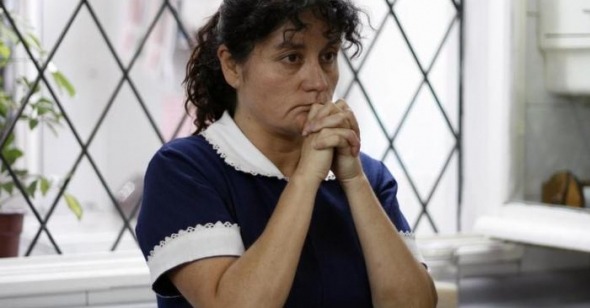In Need of Help
By Matt Connolly
The Maid
Dir. Sebastián Silva, Chile/Mexico, Elephant Eye Films
Sebastián Silva’s The Maid begins as a wry look at the fault lines between domestic familiarity and class disparity and gradually morphs into a kind of blackly comic quasi-monster movie, before segueing into an empathetic, restrained tale of personal growth. Yet Silva keeps quietly recalibrating the film’s generic parameters while keeping its central questions consistent. It’s a fairly elegant trick, and if Silva’s shifts in tone result in a bit of viewer whiplash, actress Catalina Saavedra guides us through with a nuanced and tightly controlled central performance. She keeps us coming back, with equal parts sympathy and fascination, to the same query: who is this woman, and what is her deal?
Saaverda is Raquel, the eponymous domestic worker. A slightly hunched figure with a mop of black ringlets, eyes filled with suspicion, and lips perennially twisted into a frown, Raquel has been employed by the upper-class Valdez family for 23 years. Right from the start, the film takes a cock-eyed view of Raquel’s relationship with the Valdezes, highlighting her neither-this-nor-that status as a live-in paid employee with a crisply observed birthday celebration for Raquel put on by the family (who cleans up the dishes after?). Each family member has a particular relationship with Raquel— running the gamut from teasing affection to guilt-laced sympathy to outright hostility— and Silva attunes his ear to the specific ways the family speaks to and about her.
From the very beginning, though, we get the sense that there is more to this story than the awkward negotiation of personal bonds and professional responsibilities. If Raquel’s outside-looking-in position leads to moments of simultaneous resentment and affection for the family she serves, her bizarre behavioral tics and perennial dourness suggest a knottier, more troubling past. Silva elides this central mystery, dropping occasional hints of a troubled family life without going into specifics. In this way, The Maid places us in the ambivalent position of both knowing and not knowing Raquel: privy to her private moments of exhaustion and anger without fully understanding the poisoned well from which they spring. It’s a choice at once empathetic and distancing, switching up the film’s primary trajectory from social satire to character study; and Silva takes pleasure in pushing us to consider just how far we are willing to extend our sympathy to a character whose behavior dips into some pretty strange—and often cruel—places.
Raquel begins having bouts of crippling migraines and dizzy spells, eventually landing in the hospital after collapsing in front of the family. Pilar (Claudia Celedon), the self-conscious if not always self-aware family matriarch, hires additional help to temporarily take over Raquel’s duties while she recuperates at home: first the youthful and sweet Mercedes (Mercedes Villanueva) and later the taciturn Sonia (Anita Reeves), the longtime servant of Pilar’s class-snob mother. In both instances, Raquel stages a kind of psychological warfare against them, engaging in behavior that spans from outrageously petty (locking them out of the house and watching their frustration from an upstairs window) to the perversely insensitive (setting loose a family cat whom Mercedes agreed to look after). Silva makes little effort to hide his glee in staging these bouts of everyday cruelty. His handheld digital camera stalks after Raquel in unbroken long takes and catches her face at particularly unflattering angles, at times giving her the grimly possessed look of a gargoyle. Both outrageous and captivating, Raquel’s antics often tip into the grotesque, yet the film manages to pull us back before we can ever dismiss her as a screw-loose monster. Much of this comes from the way Saavedra imbues even Raquel’s most repellent moments with crosscurrents of doubt, fear, and a crippling anxiety of the world around her, conveyed via her wide, darting eyes.
Silva eventually edges back from this play with viewer identification, though, as he guides Raquel to a kind of personal redemption through her budding friendship with Lucy (Mariana Loyola), the third replacement maid who counteracts Raquel’s attacks with good-natured, no-bull directness. Lucy slowly brings Raquel out of herself, even inviting her to spend Christmas with her and her large family out in the country. Saavedra plays these scenes just right, with Raquel’s tentative steps toward contentment as characteristically ungainly and halting as they are satisfying.
Still, Silva’s tonal hop-scotching leaves a residue in the viewer’s mind. Plot points that acted as bits of characterization—for instance, the largely unexplored acrimony between Raquel and the family’s daughter Camila (Andrea Garcia-Huidobro)—are simply abandoned. One wonders what the results would have been if Silva kept his satire as pointed throughout the film as he does in its opening scenes, or if he dared to elicit our sympathy for Raquel while continuing her reign of terror over the other maids. But this isn’t really a slam against Silva’s choices. Indeed, Raquel’s slow lurch toward happiness feels all the more earned for the depths to which we’ve seen her sink, and all the more intriguing for the way Saavedra gestures towards Raquel’s past traumas without us ever knowing what they are.
